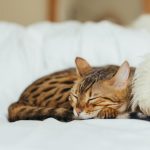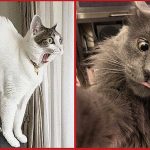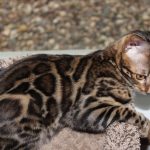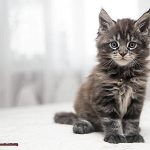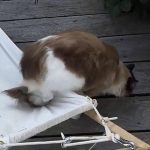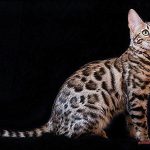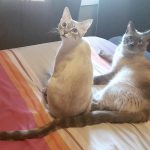As a devoted cat parent, you want nothing but the best for your furry friend, especially when they are battling Inflammatory Bowel Disease (IBD). This chronic condition can wreak havoc on your cat’s digestive system, leading to unpleasant symptoms like vomiting, diarrhea, and weight loss. And while medication can help manage IBD symptoms, it’s equally crucial to pay attention to your cat’s diet.
But what exactly should cats with IBD avoid eating? The answer may surprise you. Unfortunately, many commercial cat foods contain ingredients that can trigger inflammation in your feline friend’s gut. As a result, finding the right food for your cat can be a daunting task.
In this blog post, we’ll delve into the types of foods that cats with IBD should steer clear of. We’ll explore common allergens and ingredients that can exacerbate inflammation and discomfort in your cat’s digestive tract. Additionally, we’ll discuss the advantages of specialized diets designed specifically for cats with IBD and provide valuable tips to help you transition your kitty to a new meal plan.
By following our advice and avoiding problematic foods, you can help improve your cat’s quality of life and ensure they stay healthy and happy for years to come. So buckle up and let’s dive into the world of feline nutrition.
What is IBD in Cats?
This condition occurs due to inflammation in the gastrointestinal tract, leading to symptoms such as frequent vomiting, diarrhea, weight loss, and lack of appetite.
While the exact cause of IBD is unknown, it is believed to be triggered by multiple factors such as genetics, diet, and environment. The inflammation caused by IBD can lead to other serious health issues if left untreated, including malnutrition and dehydration.
If you suspect your cat has IBD, it is essential to take them to a veterinarian who will perform a series of diagnostic tests to confirm the diagnosis and rule out other conditions like parasites or infections. These tests may include blood work, stool analysis, and diagnostic imaging like X-rays or ultrasounds.
Once diagnosed with IBD, it’s crucial to develop a management plan that includes dietary changes. Avoiding certain foods that trigger inflammation and introducing a balanced diet can help cats with IBD experience significant improvement in their symptoms.
To manage IBD in cats effectively, it’s vital to avoid certain problem foods like wheat, corn, soy, and dairy products. These foods are difficult for cats to digest and can lead to gastrointestinal distress. Additionally, certain proteins like chicken or beef may exacerbate symptoms in some cats.
Instead, diets for cats with IBD should focus on easily digestible proteins and limited ingredients. Prescription diets specifically formulated for cats with digestive issues or homemade diets recommended by a veterinarian or veterinary nutritionist are good options. These diets will contain the necessary nutrients for your cat while avoiding problem foods that can trigger inflammation.
It’s important to note that while IBD cannot be cured fully, proper management and treatment can significantly improve your cat’s quality of life. By sticking to a carefully controlled diet and avoiding problem foods, cats with IBD can manage their symptoms and lead healthy lives.
Foods to Avoid for Cats with IBD

It can be challenging to see your cat suffer from uncomfortable symptoms like vomiting, diarrhea, and weight loss. Fortunately, dietary changes can play a significant role in managing IBD in cats. The right diet can reduce inflammation in the digestive system, decrease symptoms and improve their overall health.
To start, it’s essential to provide your cat with a hypoallergenic diet. Common allergens like beef, chicken, dairy, wheat, corn, and soy can trigger inflammation and worsen symptoms. Rather than these ingredients, opt for a single protein source that your cat has not been exposed to before. Novel proteins like rabbit or venison may be an excellent choice. A hypoallergenic diet is crucial to managing IBD in cats as it helps reduce inflammation in the digestive system.
Another important factor is the quality of the food you’re feeding your cat. Highly processed or artificial foods can be challenging for cats to digest and may contain additives or preservatives that can trigger inflammation. Instead, choose a high-quality, natural diet that is rich in whole foods. This type of diet is easy on your feline friend’s digestive system and contains essential nutrients they need to stay healthy.
Lastly, it’s important to monitor the fat content of your cat’s diet. High-fat diets can cause gastrointestinal distress and may exacerbate IBD symptoms. Therefore, choose cat foods that are low in fat and easy to digest.
In summary, it’s essential to feed your cat with IBD a high-quality, low-allergen diet that is easy to digest and doesn’t contain unnecessary additives or preservatives. By avoiding certain ingredients and providing your cat with the right nutritional balance, you can help manage their IBD symptoms and improve their overall health and well-being.
Grains and Fillers
These ingredients are often added to cat food because they are cheap and provide bulk, but they can cause digestive problems for your cat.
Grains like corn, wheat, and soy are particularly troublesome as they are difficult for cats to digest. Eating these grains can lead to inflammation and irritation in the digestive tract, making IBD symptoms such as vomiting, diarrhea, and weight loss even worse. Additionally, other types of fillers like cellulose or beet pulp can also cause issues if included in high quantities.
So what should you look for instead? A high-quality protein source is crucial for your cat’s health, such as chicken or fish. Carbohydrates should be limited in your cat’s diet. Choosing a grain-free or a limited ingredient diet may also be helpful.
Reading the ingredients list on your cat’s food is vital to ensure your cat is getting the best nutrition possible. By avoiding grains and fillers, you can help manage your cat’s IBD symptoms and improve their overall health.
Proteins Sensitivities and Allergies
This chronic condition can cause discomfort, pain, and digestive issues that can severely affect your cat’s quality of life. However, there are ways to manage IBD and reduce symptoms, such as identifying and avoiding trigger foods.
One common culprit for IBD in cats is protein sensitivities and allergies. Certain protein sources may cause inflammation and irritation in the gut, making it crucial to monitor your cat’s diet carefully. Beef, chicken, fish, and dairy are some of the most common protein sources that cats with IBD should avoid.
It’s also worth noting that grains like corn, wheat, and soy can contribute to inflammation in the gut and exacerbate IBD symptoms. While not all cats with IBD will have a grain sensitivity, trying a grain-free diet could help alleviate their symptoms.
When choosing cat food for your feline friend with IBD, it’s crucial to read the labels carefully. Look for high-quality protein sources such as novel proteins like rabbit, venison, or duck. Limited ingredient diets can also be beneficial as they contain fewer ingredients, making it easier to identify any potential allergens or sensitivities.
Feeding your cat small, frequent meals throughout the day can help reduce the workload on their digestive system and prevent flare-ups of symptoms. It’s also recommended to avoid feeding your cat any table scraps or human food as these may contain ingredients that could trigger symptoms of IBD.
Overall, identifying trigger foods is an essential part of managing IBD in cats. Consulting with a veterinarian or veterinary nutritionist can help you develop a tailored diet plan that meets your cat’s specific needs and dietary restrictions.
High-Fat Foods
If your cat is struggling with inflammatory bowel disease (IBD), it’s essential to identify trigger foods and avoid them at all costs. One type of food that should be avoided when it comes to feline IBD is high-fat foods.
High-fat diets can lead to inflammation and discomfort in the gastrointestinal tract, which can exacerbate your cat’s IBD symptoms. Foods such as fatty meats, oily fish, cheese, and dairy products are all high in fat content and should be avoided if possible. However, it’s important to note that not all types of fats are bad for your cat. Some fats are essential for their overall health and wellbeing, so it’s crucial to ensure that their diet contains the right balance of fats.
One risk associated with high-fat diets is obesity. Obesity in cats is a risk factor for IBD, so it’s crucial to ensure your cat maintains a healthy weight. To prevent aggravating IBD symptoms and maintain a healthy weight, look for commercial cat food brands that offer low-fat options. Alternatively, consult with your veterinarian to determine the best diet for your cat’s specific needs.
If you prefer to make homemade diets for your cat, it’s important to work with a veterinary nutritionist to ensure that the recipe provides all the necessary nutrients without being too high in fat. Homemade diets can be tailored to meet your cat’s dietary requirements but must be balanced correctly.
In conclusion, avoiding high-fat foods is crucial for cats with IBD. A balanced diet with the right amount of fat can help manage your cat’s symptoms and improve their overall health. Don’t hesitate to consult with your veterinarian or veterinary nutritionist if you have any concerns about your cat’s diet or digestive health.
To summarize:
Foods That Cause Gastrointestinal Distress
If your cat has IBD, knowing which foods to avoid is crucial to managing their symptoms and improving their overall health.
Grains are one of the primary culprits for gastrointestinal distress in cats with IBD. Complex carbohydrates found in grains such as corn, wheat, and soy can be difficult for cats to digest, leading to inflammation and irritation in the gut. To avoid this, opt for grain-free cat food that contains easily digestible proteins and carbohydrates.
Dairy products are another food group that should be avoided. Lactose, a sugar found in milk, can cause digestive issues such as diarrhea in cats with IBD. Instead, consider lactose-free options such as cheese made from goat or sheep’s milk.
High-fat foods can also be problematic for cats with IBD. Fatty foods can be hard to digest, leading to nausea, vomiting, and diarrhea. Stick to lean proteins like chicken or fish and avoid high-fat treats such as bacon or sausage.
Processed foods that are high in sugar or artificial additives should also be avoided. These types of foods can trigger gastrointestinal distress in cats with IBD. Instead, opt for natural, whole foods that are minimally processed.
It’s important to remember that every cat with IBD may have different trigger foods. Some may be more sensitive to certain types of protein or fiber than others. Work closely with your veterinarian to identify which foods your cat should avoid and which ones they can safely eat.
Easily Digestible Proteins
Managing the symptoms of inflammatory bowel disease (IBD) in cats can be a daunting task. However, one of the most important things you can do to support their digestive health is to provide them with a diet that includes easily digestible proteins. These proteins are broken down quickly and efficiently by the digestive system, reducing the strain on your cat’s gut.
The best sources of easily digestible proteins for cats with IBD include chicken, turkey, and fish. These proteins are not only easy to digest but also contain essential nutrients that are necessary for your cat’s overall health and wellbeing. However, it is crucial to note that not all types of fish are safe for cats. Some types, such as tuna, contain high levels of mercury that can be harmful to cats when consumed in large amounts.
In addition to choosing the right proteins, it is important to avoid feeding your cat foods that are high in fat. High-fat diets can worsen the symptoms of IBD by causing inflammation in the gut. It is also crucial to steer clear of foods that contain grains and other allergens such as soy and wheat. These ingredients can trigger allergic reactions in cats, leading to further complications.
If you’re wondering how you can make sure your cat gets the nutrients they need while avoiding foods that may aggravate their condition, there are plenty of options available. For example, many commercial pet food brands offer specialized diets that cater to cats with IBD. Alternatively, you can work with your veterinarian to create a customized nutrition plan that meets your cat’s specific needs.
Prescription Diets for IBD Cats
These specially formulated diets are designed to ease digestive issues and promote overall gut health. They can be a game-changer for cats struggling with this condition.
One of the most popular types of prescription diets for IBD cats is the hydrolyzed protein diet. This type of diet contains proteins that have been broken down into smaller molecules, making them easier for the body to absorb and less likely to trigger an immune response. This diet is particularly beneficial for cats dealing with severe food allergies or sensitivities.
Another option is a Limited Ingredient Diet (LID) which contains only a few ingredients. These diets typically feature a single source of protein and carbohydrates such as chicken and rice. LID diets are less likely to cause an allergic reaction or trigger an IBD flare-up, making them the go-to option for cats with sensitive stomachs.
Prescription diets that cater specifically to cats with gastrointestinal issues are also available. These diets contain added fiber such as psyllium or beet pulp, which can help regulate bowel movements and improve digestion. They also contain prebiotics and probiotics that promote the growth of healthy gut bacteria and improve overall gut health.
It’s important to note that not all prescription diets are created equal, and seeking advice from your veterinarian before starting your cat on any new diet is crucial. Your veterinarian can determine which diet is best suited to your cat’s specific needs, monitor their progress, and make necessary adjustments.
2rAUhE3ZyDc” >
Conclusion
Managing Inflammatory Bowel Disease (IBD) in cats can be a daunting task. The condition causes inflammation in the gastrointestinal tract, leading to symptoms like vomiting, diarrhea, weight loss, and lack of appetite. While medication can help alleviate IBD symptoms, dietary changes are equally crucial.
As a cat parent, it is essential to understand what foods your furry friend should avoid eating. Many commercial cat foods contain ingredients that can trigger inflammation in your feline friend’s gut. Corn, wheat, soy, dairy products and high-fat foods are some of the culprits that can exacerbate IBD symptoms.
Instead of feeding your cat these trigger foods, opt for hypoallergenic diets that focus on easily digestible proteins and limited ingredients. Prescription diets specifically formulated for cats with digestive issues or homemade diets recommended by a veterinarian or veterinary nutritionist are excellent options.
To ensure you’re providing the right nutritional balance for your feline friend with IBD, read the labels carefully when choosing their food. Look for high-quality protein sources such as novel proteins like rabbit, venison or duck.
It’s vital to identify trigger foods when managing IBD in cats. Consulting with a veterinarian or veterinary nutritionist can help you develop a tailored diet plan that meets your cat’s specific needs and dietary restrictions.
By avoiding certain ingredients and providing your cat with the right nutritional balance through proper management and treatment, they can lead healthy lives despite their chronic condition.
